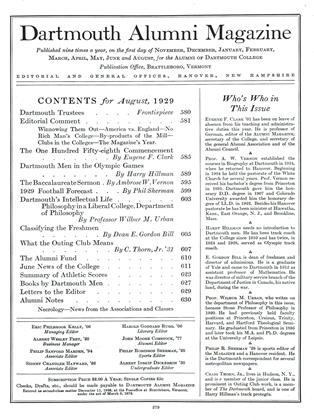In naming the Baccalaureate speaker for the Commencement exercises of the 161st year of the College, PresidentHopkins chose the man who was the selection of theseniors themselves. Many members of the graduatingclass requested that Professor Vernon he asked to delivertheir Baccalaureate sermon because of their respect andadmiration for him. He is one of Dartmouth's best-likedteachers. Enrollment in his courses in Biography, establishedby him a few years ago, is as eagerly sought as itis a matter of pride to the students who have completedtheir work under his instruction.
"A Straight Course in a Time of Uncertainty'" is asermon which will remain long in the minds of the congregation which filled every seat and aisle of RollinsChapel the morning of June 16. It is reprinted below atthe request of many alumni and seniors.
Matthew 25: 14-18. For the kingdom of heaven is as when a man, going into another country, called his servants and delivered unto them his goods. . . . Straightway he that had received the five talents went and traded with them and made other five talents. But he that had received one went away and digged in the earth and hid his lord's money.
EMBKSON once remarked: "People want to be settled; only so far as they are unsettled is there any hope for them." It is scarcely necessary to adduce proof for the statement that we are intellectually and spiritually in a frame of mind that would have satisfied Emerson. The doctrine of evolution, which dominates our thinking, makes us far less certain of the beginning and of the goal of creation than of the fact that it is going on. To quote another of Emerson's sentences: "Nowhere is anything final; planet, system, constellation, total nature is growing like a field of maize in July." We do not know where we have come from, where we are going, not even how we came; we only know that we are suffering change.
In particular, our religious beliefs and the intellectual presuppositions of our religion are unsettled; before a company of men like this, it would be absurd not to say frankly what nearly all of us think. You have become aware that Christianity stands on a different footing now than formerly. The careful and scholarly examination of the Bible documents by Christian scholars has established the fact—in my judgment and, so far as I can see, in yours—that those documents are of such a character that they cannot guarantee the truth of the facts which they record. From the birth of Jesus of Nazareth we still date each revolving day, this Commencement of ours, the founding of our college and of our country and every action of our own. That he lived, that he spoke as no man ever spoke, that he died for a conviction that before him no man had harbored and that after him became the common property of the western world, that the insight of his soul has proven both the cement which has held society together and the dynamite which has blasted new paths for its progress is assuredly true. But that his body was raised from the dead on the third day after its entombment, that he called any dead man back to life, that he came into the world or left it in a unique fashion, simply can not be proven. And in the absence of any definite proof for these supposedly visible occurrences, our experience both with nature and with religious documents, compels us to reject that body of evidence which until recently guaranteed the truths of the Christian religion through the evidence of the senses for multitudes of men.
It would seem therefore—to men of my generation, at •least—as though we once more were living in a time much like that in which Christ himself lived; a time of a great evacuation, of a withdrawal of immense forces which had given security and comfort to mankind. It seems as if Jesus were standing in our own midst and speaking for us when he declares: "The kingdom of heaven is as when a man, going into another country, called his servants and delivered unto them his goods." God as our fathers limned him, the assured message of great prophets, the faith upon which the Christian world has firmly reckoned, has left us and gone into another country. The age of paternalism, of authoritarianism, of dogmatism, has ended; the day of selfreliance, of independent thinking, of undirected stewardship, of adventure, has come.
PROFESSOR VERNON
 View Full Issue
View Full Issue
More From This Issue
-
 Class Notes
Class NotesCLASS OF 1879
August 1929 By Henry Melville -
 Article
ArticleAlumni Council Meetings
August 1929 -
 Article
ArticleThe One Hundred Fifty-Eighth Commencement
August 1929 By Eugene F. Clark -
 Class Notes
Class NotesCLASS OF 1899
August 1929 By Warren C. Kendall -
 Class Notes
Class NotesCLASS OF 1903
August 1929 By John Crowell -
 Class Notes
Class NotesCLASS OF 1918
August 1929 By Frederick W. Cassebeer
Ambrose W. Vernon
-
 Article
ArticleHeritage of the Past
AUGUST 1929 By Ambrose W. Vernon -
 Article
ArticleTwo Courses Open
AUGUST 1929 By Ambrose W. Vernon -
 Article
ArticleResults of Risks
AUGUST 1929 By Ambrose W. Vernon -
 Article
ArticleDiscrimination in Risks
AUGUST 1929 By Ambrose W. Vernon -
 Article
ArticleTake the Nobler Risk
AUGUST 1929 By Ambrose W. Vernon -
 Article
ArticleThe Supreme Risk
AUGUST 1929 By Ambrose W. Vernon
Article
-
 Article
ArticleCHURCH REPORT
FEBRUARY, 1907 -
 Article
ArticleDARTMOUTH ALUMNI IN EDUCATION
November 1920 -
 Article
ArticleHeadaches, But Fun
November 1940 -
 Article
ArticleFourth Conference To Spur National Enrollment Work
October 1954 -
 Article
ArticleHALLS OF NAME
Sept/Oct 2008 By C.J. Hughes ’92 -
 Article
ArticleMetaphysical Voyager
December 1980 By Robert H. Ross ’38

